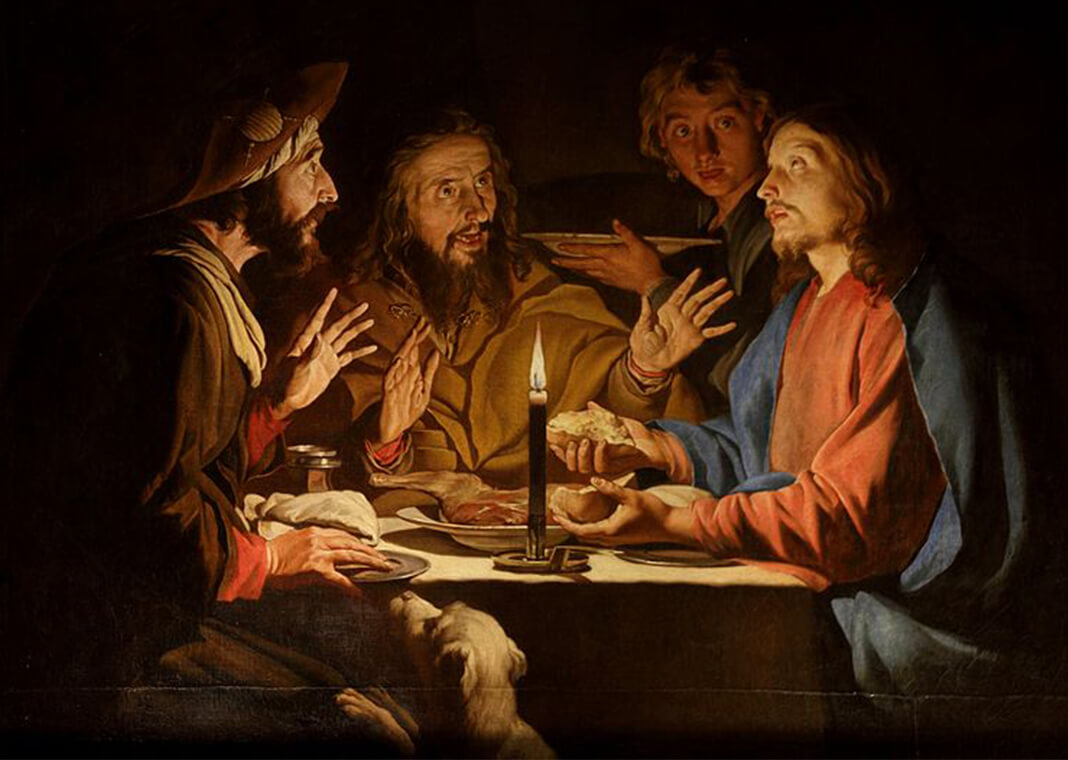
This imaginative prayer exercise is based on Luke 24:13–35, the story of the disciples on the road to Emmaus. Listen to an audio version of this guided reflection here.
It’s a long walk home from Jerusalem, but you’re glad for the exertion. The physical work of walking might ease, just slightly, the harder work that’s going on inside you today.
It is the work of grief. You lost a friend just a few days ago. Not only a friend, but your leader, your beloved teacher. And he didn’t simply die; he was executed in the most torturous, shameful way. You’ve seen a lot in your lifetime, but the memories of Jesus’ ordeal are forever branded into your memory. You close your eyes and see blood; you go to sleep but dream about someone suspended, gasping for air.
At least your friend is with you—both of you followed the teacher, with equal conviction and enthusiasm. So you bear your grief together now. As you walk and walk through the long, rainy afternoon, you encourage better memories—of all that the teacher said, of the people you know whom Jesus healed. You can’t seem to stop talking, although several times one or both of you must stop talking because you must cry for a while.
The stranger joins you while you are still several miles from home. Within moments, it’s clear that this person has no idea what has been going on in Jerusalem. With great heaviness and some annoyance, you fill in the barest details for him. All you have to say is “crucifixion” and anyone in Roman territories knows exactly what you’re talking about.
But the stranger engages in the conversation with great energy. He must be some kind of teacher, because he launches into an explanation of how Jesus’ fate is actually a good thing and the proper fulfillment of what was predicted long ago. This is fascinating—you and your friend are all ears. Before you know it, you’ve arrived at your home and it’s getting dark.
You invite the stranger to have supper with you and spend the night, rather than risk injury or other misfortune while on the road at night alone. Also you want to hear more of what he has to say. He graciously accepts your offer.
The first thing you do upon entering the house is prepare the evening meal. The three of you sit down to eat. Then the stranger takes the bread and blesses it. You feel a strange energy move through you and hover in the room.
Where have you heard this sort of blessing before?
The stranger hands each of you a piece of the bread. You take it, and memory washes over you—of a hillside with thousands of hungry people. Of a few loaves and fishes being transformed in an instant to miraculous abundance.
Suddenly, it is clear who this man is, eating at your table. You look into his face.
What do you see? What is his expression? What do you feel? What do you know in the truth of your heart?
Your friend has barely gotten the words out—“Why, it’s the Lord!”—when the stranger vanishes.
The room still feels strangely warm, and there are waves of that energy, like lightning sparking all over the room. You and your friend stare at one another, and finally you say, “Weren’t our hearts on fire when he explained the Scriptures? Didn’t we know something even then—we just couldn’t identify it?”
You finish your meal—what a healing pleasure to eat the bread blessed by those hands! But then you look at each other and know what you must do. You head back to Jerusalem. You have to tell Jesus’ other followers who are still there in the city.
What is your conversation like on the way back?
You are traveling at night—something you never do, for safety’s sake. What does it feel like to be on the road at such a strange hour?
What thoughts keep running through your mind on this journey?
How has your perspective changed, now that you have met the resurrected Jesus?
—
Image: “Supper at Emmaus” by Matthias Stom, public domain via Wikimedia Commons.
